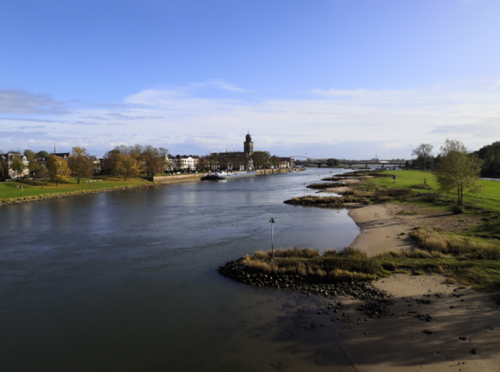Computational Methods in Fluid Dynamics for Nature Based Solutions
I am Anouk Bomers and I work as an Assistant Professor in the group of Marine and Fluvial Systems, which is part of the Water Engineering and Management department at the University of Twente. My research focusses on improving hydraulic modelling approaches for large-scale river applications.
Background
During my PhD, I focused on the reconstruction of historic flood events to enable extension of the data set of measured discharges. I found that adding historic flood events to the data set of annual maximum discharges has the potential to significantly decrease uncertainty in the design of our flood defences. To enable historic flood reconstructions, efficient hydraulic models are required in terms of model accuracy and computational times due to the large number of uncertainties that need to be included in the analysis. Therefore, I developed models with various complexities, ranging from detailed 2D models to non-physical data-driven models to analyse the trade-offs between computational times and the accuracy of model predictions.
Besides of trying to improve various physical components in detailed hydraulic models (e.g., main channel friction under varying discharges), I also strive to develop data-driven models that have the potential to be used as a flood early warning system in crisis situations.
In the years to come
In the future, I hope to develop fast hydraulic modelling approaches that can be used for real-time predictions. Future scenarios should be computed in a probabilistic manner such that a fair estimation of the related uncertainties is predicted. The outcomes of these models, and corresponding uncertainties, should be presented in such a way that they can be used by decision-makers during crisis situations. Therefore, it is very important to have a good understanding of the needs of practitioners. Furthermore, I aim to improve my teaching skills and I hope to make new students enthusiastic about doing research in river hydraulics.

Education
As well as doing research, I teach the Civil Engineering master course Hydraulic modelling. In this course, students learn which type of hydraulic model (1D, 2D, etc.) they need to use for a specific problem. Furthermore, the students learn how to detect the most influential model input parameters, how to determine model accuracy and interpret model results, and how to communicate their findings to a client. Alongside teaching, I also supervise both bachelor and master students on a regular basis during their graduation project and I am a mentor of first-year students.
Collaborations
To ensure that the needs of practitioners are being met, I work in close collaboration with the Dutch Ministry of Infrastructure and Water Managements, Deltares and various Water boards. Furthermore, I co-operate with the Institute of Hydrology and Water Resource Management (TU Wien) to gain insight on the effect of large-wood on river hydraulics.

